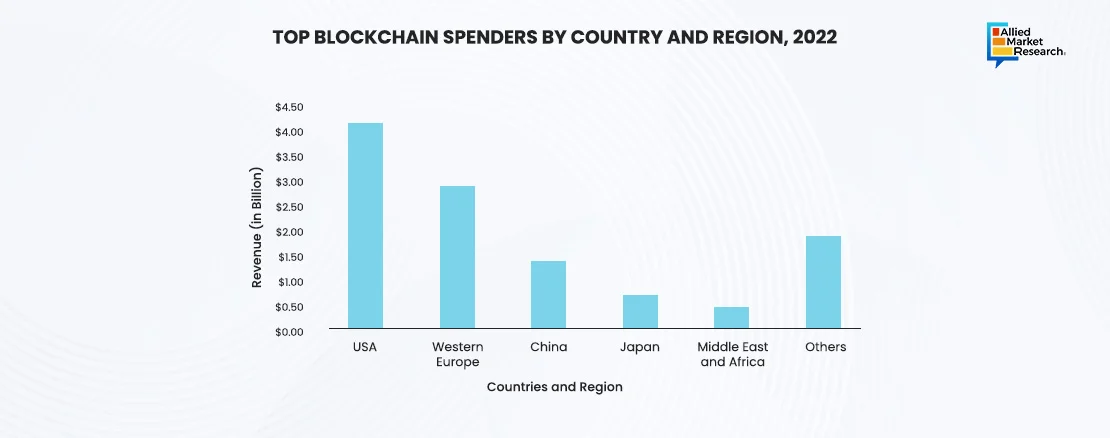Table Of Contents
- Understanding Blockchain Technology and Its Adoption across the Globe
- At its core, blockchain is a decentralized ledger technology that enables secure, transparent, and immutable recording of transactions across a network of computers. Unlike traditional centralized databases, where a single authority controls data, blockchain distributes data across a network of nodes, ensuring transparency and reducing the risk of data manipulation or unauthorized access.The top blockchain technology spenders are the USA, Western Europe, China, Japan, and regions in the Middle East and Africa, each leading adoption for distinct reasons. The United States leads in blockchain technology with its strong tech industry and investment in innovation, aiming to improve data security and efficiency. Western Europe is close behind, driven by supportive regulations and digital transformation efforts in finance and healthcare. China’s adoption is boosted by government support and a focus on using blockchain for supply chain management and financial services. Japan leverages its advanced tech infrastructure to invest in blockchain for secure transactions and identity verification. In the Middle East and Africa, blockchain is adopted to enhance financial inclusion, reduce fraud, and improve transparency across industries.Blockchain in EHR: Enhancing Interoperability and Data Security
- Ensuring Drug Supply Chain Integrity in the Digital Age
- Furthermore, in the context of COVID-19, in 2021, Moderna had employed blockchain to monitor the distribution and administration of its vaccines, ensuring that every dose is tracked and verifiable, thereby strengthening public trust in vaccine integrity. These real-time applications illustrate blockchain's potential to revolutionize the pharmaceutical supply chain, ensuring that patients receive safe and authentic medications.The Impact of Blockchain Technology on Clinical Trial Transparency
- Leveraging Blockchain Technology for Patient Data Integrity
- Improving Healthcare Interoperability via Blockchain
- Enhancing Patient-Centered Care through Blockchain
- Closing Section

Roshan Deshmukh

Koyel Ghosh
Blockchain in Healthcare: Revolutionizing Medical Records and Beyond

In the digital age, where data privacy and security are paramount concerns, blockchain technology has emerged as a transformative force, promising to reshape various industries, including healthcare. Initially known for its association with cryptocurrencies, blockchain’s decentralized and immutable nature has found extensive application beyond financial transactions. In healthcare, the potential of blockchain technology to enhance data management, secure medical records, and streamline processes holds immense promise. This article looks at how blockchain is changing healthcare, highlighting its uses, advantages, and challenges.
Understanding Blockchain Technology and Its Adoption across the Globe
At its core, blockchain is a decentralized ledger technology that enables secure, transparent, and immutable recording of transactions across a network of computers. Unlike traditional centralized databases, where a single authority controls data, blockchain distributes data across a network of nodes, ensuring transparency and reducing the risk of data manipulation or unauthorized access.
The top blockchain technology spenders are the USA, Western Europe, China, Japan, and regions in the Middle East and Africa, each leading adoption for distinct reasons. The United States leads in blockchain technology with its strong tech industry and investment in innovation, aiming to improve data security and efficiency. Western Europe is close behind, driven by supportive regulations and digital transformation efforts in finance and healthcare. China’s adoption is boosted by government support and a focus on using blockchain for supply chain management and financial services. Japan leverages its advanced tech infrastructure to invest in blockchain for secure transactions and identity verification. In the Middle East and Africa, blockchain is adopted to enhance financial inclusion, reduce fraud, and improve transparency across industries.
Blockchain in EHR: Enhancing Interoperability and Data Security
Blockchain technology is revolutionizing Electronic Health Records (EHR) by enhancing security, interoperability, and patient control over their data. A blockchain records transactions across many computers, ensuring that the record cannot be altered retroactively. This technology is particularly valuable in healthcare, where data integrity and privacy are paramount. For instance, the MediLedger Project uses blockchain to track pharmaceutical supply chains, ensuring that medications are authentic and safe.
In addition, Estonia has implemented a nationwide blockchain-based health record system developed by Guardtime. The system ensures the integrity of health records by using blockchain to log every access and modification to the data. Furthermore, BurstIQ is a blockchain-based platform that focuses on health data interoperability and security. It allows healthcare providers, researchers, and patients to share data securely and transparently. Moreover, Patientory is a blockchain-based healthcare platform that provides secure storage and management of health information. It integrates with existing EHR systems and allows patients to control their health data.

Ensuring Drug Supply Chain Integrity in the Digital Age
Blockchain technology has emerged as a transformative tool in enhancing the integrity of drug supply chains, offering transparency, security, and efficiency. By providing a decentralized and immutable ledger, blockchain ensures that every transaction and movement of pharmaceutical products is recorded in real-time and cannot be altered. This capability addresses issues such as counterfeiting, fraud, and compliance with regulatory standards. For instance, in 2019, the MediLedger Project, which involves major pharmaceutical companies like Pfizer and Genentech, uses blockchain to track drugs from production to the end consumer, ensuring authenticity and reducing the risk of counterfeit drugs entering the supply chain. Another notable example is IBM's collaboration with KPMG, Merck, and Walmart to develop a blockchain-based system that enhances drug traceability and compliance with the Drug Supply Chain Security Act (DSCSA) in the U.S. This initiative demonstrates how blockchain can streamline regulatory reporting and improve recall efficiency.
Furthermore, in the context of COVID-19, in 2021, Moderna had employed blockchain to monitor the distribution and administration of its vaccines, ensuring that every dose is tracked and verifiable, thereby strengthening public trust in vaccine integrity. These real-time applications illustrate blockchain's potential to revolutionize the pharmaceutical supply chain, ensuring that patients receive safe and authentic medications.
The Impact of Blockchain Technology on Clinical Trial Transparency
Blockchain technology is increasingly being explored and implemented in clinical trials and research to address various challenges such as data integrity, transparency, and security. One notable application is in ensuring the immutability and traceability of data throughout the trial process. By using blockchain, researchers can securely record and track every transaction or change made to data, from patient recruitment to the final analysis, ensuring that all actions are transparent and tamper-proof.
For instance, the company MedRec is using blockchain to improve medical record management by providing patients with a unified record that healthcare providers can access securely and in real-time. In clinical trials, this technology can similarly enable secure sharing of patient data among researchers while maintaining privacy and data ownership.
In addition, Pfizer, the pharmaceutical company, is using blockchain technology to guarantee the validity of drugs and optimize the supply chain. This technique can also be utilized in clinical trials to confirm the legitimacy of the medications employed in the investigations, lowering the possibility that trial outcomes would be tainted by subpar medications.
Leveraging Blockchain Technology for Patient Data Integrity
Blockchain technology is now revolutionizing telemedicine and remote patient monitoring by enhancing security, transparency, and efficiency. It securely stores and shares patient records across different healthcare providers and systems. Blockchain's decentralized ledger ensures that patient data remains tamper-proof and accessible only to authorized parties, thereby mitigating privacy concerns and improving data integrity. For example, MedRec is a blockchain-based platform that enables patients to manage their medical records securely and grant access to healthcare providers as needed, facilitating seamless telemedicine consultations.

Moreover, blockchain facilitates real-time monitoring of patient-generated health data (PGHD), such as vital signs and medication adherence, from wearable devices. By recording PGHD on the blockchain, healthcare providers can access accurate and up-to-date information instantaneously, enabling proactive intervention and personalized treatment plans. This capability is exemplified by projects like Health Wizz, which leverages blockchain to aggregate and secure PGHD, empowering patients to share data with healthcare providers and researchers securely.
Furthermore, blockchain enhances telemedicine's payment and reimbursement processes by enabling smart contracts that automate transactions based on predefined conditions. This feature streamlines billing and reduces administrative overhead, exemplified by initiatives such as Medicalchain, which uses blockchain to facilitate direct payments between patients and healthcare providers for telemedicine services.
Improving Healthcare Interoperability via Blockchain
Blockchain technology holds significant potential in improving interoperability and data exchange within healthcare systems by ensuring secure, transparent, and efficient transactions. For instance, GemOS, this blockchain-powered platform focuses on healthcare data exchange and management. It allows healthcare organizations to securely share patient data across different systems, ensuring interoperability while maintaining data security. In addition, ProCredEx, this platform uses blockchain for credentialing healthcare providers. It facilitates the verification and sharing of provider credentials among hospitals, insurers, and other healthcare organizations, reducing administrative burdens and improving trust in credentialing processes. Furthermore, Clinicall integrates blockchain to create a global health platform that allows patients to access their medical records worldwide. It aims to improve healthcare access and interoperability by securely storing and sharing health data across borders. Moreover, Nebula Genomics utilizes blockchain to allow users to control and monetize their genomic data. It ensures secure and transparent data sharing while maintaining privacy and data ownership.
Enhancing Patient-Centered Care through Blockchain
Blockchain technology offers significant potential in enhancing patient-centered care and consent management by ensuring security, transparency, and efficiency in healthcare data transactions. In patient-centered care, blockchain can facilitate a unified and secure patient record system accessible to authorized healthcare providers, enabling seamless continuity of care across different providers and settings.
In consent management, blockchain enables patients to manage and track consent preferences securely. This technology ensures that patient consent is immutable, verifiable, and transparent, reducing the risk of unauthorized data usage. Healthereum, a renowned provider of patient engagement platform, uses blockchain for patient engagement and consent management. It allows patients to receive tokens as incentives for participating in clinical trials and sharing health data, while maintaining control over their consent settings.
Closing Section
Blockchain technology holds the potential to revolutionize healthcare by addressing longstanding challenges related to data security, interoperability, and transparency. Although there are implementation challenges, healthcare providers, and regulators are paving the way for blockchain in healthcare. By using blockchain’s decentralized and unchangeable features, the healthcare industry can improve patient outcomes, boost efficiency, and advance medical research. As the technology develops and adoption grows, stakeholders must collaborate to overcome obstacles and fully realize blockchain's potential in healthcare.
Allied Market Research recognizes the transformative potential of blockchain technology within the healthcare landscape. By leveraging AMR's sophisticated analytical tools and methodologies, vendors can gain a deeper understanding of market trends, consumer preferences, and competitor strategies. This data-driven approach enables vendors in the blockchain technology sector to tailor their solutions, helping them meet the evolving needs of the healthcare industry. Furthermore, AMR helps vendors identify areas where blockchain can address challenges such as data security, compatibility, and regulatory compliance, allowing for targeted innovations and interventions. With AMR’s expertise on board, vendors can optimize their practices, improve healthcare outcomes, and ultimately make a positive impact on the efficiency and security of healthcare systems. For more details, contact our esteemed professionals today!

